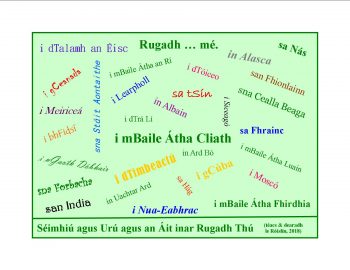Tag Archives: Siceagó
Séimhiú agus Urú agus an Áit inar Rugadh Thú (Saying Where You Were Born in Irish) Posted by róislín on Jul 28, 2018

(le Róislín) Since we’ve recently been talking about how to say where you were born, I thought a little more practice might be welcome. The graphic above shows a variety of combinations of place names, Irish and non-Irish, and the changes that occur when you use the word “in” with the place names. Remember, the…
Ag Comhaireamh Puimcíní (Counting Pumpkins in Irish) agus Beagán “Smashing” Freisin Posted by róislín on Oct 31, 2011
(le Róislín) What better íocón cultúrtha for both Mí Dheireadh Fómhair (agus Oíche Shamhna) and Mí na Samhna (November) than puimcíní? I Meiriceá, ar a laghad, ar ndóigh. Puimcíní snoite d’Oíche Shamhna – aghaidheanna scanrúla agus dradgháirí bagracha orthu! An tOllphuimcín [un TOL-FwIM-keen] (ó na scéalta faoi Charlie Brown agus Snoopy) Pióga puimcín á n-ithe…
Frásaí Eile leis an bhFocal “Lochlannach” Posted by róislín on Jan 20, 2010
(le Róislín) Recently we discussed various usages of the word “Lochlannach,” which can be translated in various ways, including “Scandinavian” and “Norse” (naisc thíos). It’s used for Norway Spruce (sprús Lochlannach) and for Swedish goosefoot (blonagán Lochlannach). I promised at least one more example, tastily potable, if it can be found to exist! That was…
Saying Where You’re From “i nGaeilge” Posted by róislín on Jun 2, 2009
The terms “Gael-Mheiriceánaigh,” “Gael-Cheanadaigh,” and “Gael-Astrálach,” discussed on May 28 and earlier, account for a large percentage of the Irish diaspora, outside the U.S. Now to get more specific. Two North American groups who could have many members wishing to identify themselves in Irish are the Nova Scotians and the Newfoundlanders. In each case…
Lá Fhéile Pádraig! Posted by róislín on Mar 12, 2009
(le Róislín) As you might have guessed, the title phrase above means “St. Patrick’s Day,” a good time for launching this “blag nua” (new blog). Remember that in pronunciation, the “fh” of the word “Fhéile” is completely silent. For that reason, you sometimes see the phrase written as “Lá ‘Éile Pádraig,” dropping the “fh” entirely. …


